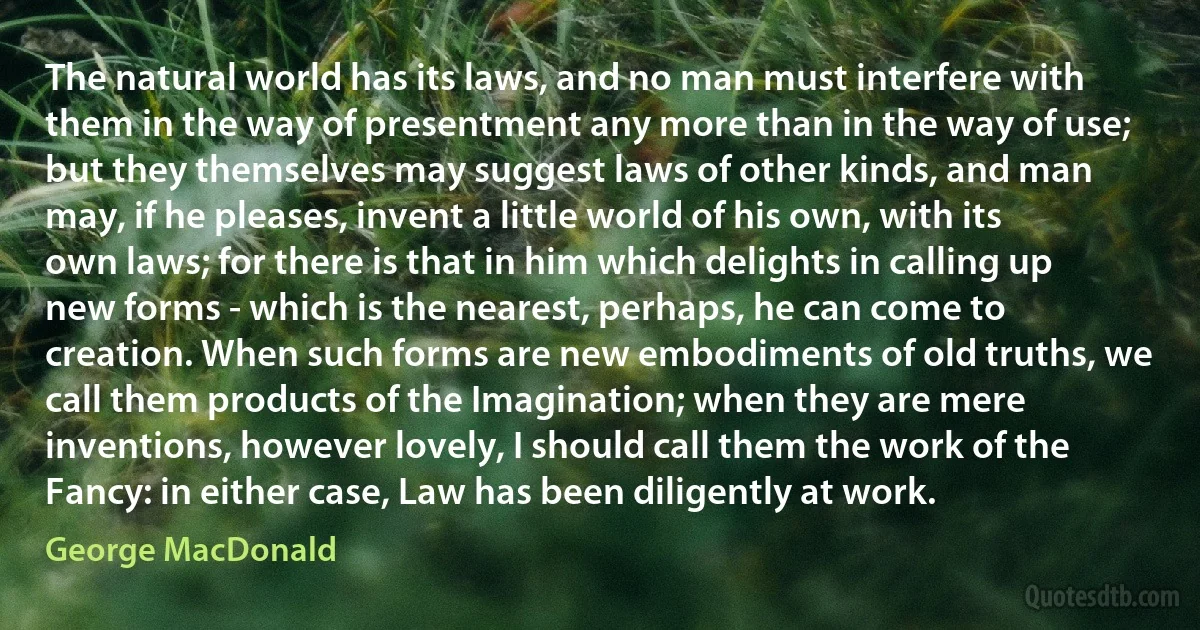
The natural world has its laws, and no man must interfere with them in the way of presentment any more than in the way of use; but they themselves may suggest laws of other kinds, and man may, if he pleases, invent a little world of his own, with its own laws; for there is that in him which delights in calling up new forms - which is the nearest, perhaps, he can come to creation. When such forms are new embodiments of old truths, we call them products of the Imagination; when they are mere inventions, however lovely, I should call them the work of the Fancy: in either case, Law has been diligently at work.
George MacDonaldRelated topics
calling call case fancy law lovely man mere natural perhaps should use way work world lawsRelated quotes
If... God highly exalted Christ because He humbled Himself, suffered dishonour, was tempted and endured a shameful cross and death for our sake, how will He save, glorify and raise us up if we neither choose humility, nor show love to our fellows, nor gain our souls by enduring temptation (cf. Lk. 21:19), nor follow the saving Guide through the 'strait gate' and along the 'narrow way' leading to eternal life (Mt. 7:14)? To this end we were called, says Peter, the chief Apostle, ' Because Christ also suffered for us, leaving us an example that we should follow His steps' (I Pet. 2:21).

Gregory Palamas
Do not do anything without signing yourself with the sign of the Cross! When you depart on a journey, when you begin your work, when you go to study, when you are alone, and when you are with other people, seal yourself with the Holy Cross on your forehead, your body, your chest, your heart, your lips, your eyes, your ears. All of you should be sealed with the sign of Christ's victory over hell. Then you will no longer be afraid of charms, evil spirits, or sorcery, because these are dissolved by the power of the Cross like wax before fire and like dust before the wind.

Cleopa Ilie
It is not unreasonable nor derogatory to the attributes of Omnipotence, to imagine that some general laws may be observed in the creation of new worlds; and if man could witness the birth of such worlds, he might reason by induction upon the origin of his own. But in the absence of such data, an attempt has been made to fancy some analogy between the agents now employed to destroy, renovate, and perpetually vary the earth's surface, and those whereby the first chaotic mass was formed, and brought by supposed nascent energy from the embryo to the habitable state.

Charles Lyell
He knew that this creature, though imperfect, though a mere creature, a mere figment of his own creative power, was yet in a manner more real than himself. For beside this concrete splendor what was he but a mere abstract potency of creation? Moreover in another respect the thing that he had made was his superior, and his teacher. For as he contemplated this the loveliest and subtlest of all his works with exultation, even with awe, its impact upon him changed him, clarifying and deepening his will. As he discriminated its virtue and its weakness, his own perception and his own skill matured. So at least it seemed to my bewildered, awe-stricken mind.

Olaf Stapledon
Creativity is not limited to people practising one of the traditional forms of art, and even in the case of artists, creativity is not confined to the exercise of their art. Each one of us has a creative potential, which is hidden by competitiveness and success-aggression. To recognize, explore and develop this potential is the task of the School. Creation – whether it be a painting, sculpture, symphony or novel – involves not merely talent, intuition, powers of imagination and application, but also the ability to shape material that could be expanded to other socially relevant spheres.

Joseph Beuys
